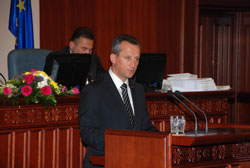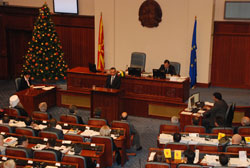Thursday, 23 December 2010
ADDRESS OF THE PRESIDENT OF THE ASSEMBLY OF THE REPUBLIC OF MACEDONIA MR.TRAJKO VELJANOSKI on the occation of the commemoration of the 1,100 years since the death of St. Naum the Miracle Maker
 Distinguished President of the Republic of Macedonia, Mr. George Ivanov,
Distinguished President of the Republic of Macedonia, Mr. George Ivanov,
Distinguished Prime Minister of the Republic of Macedonia, Mr. Nikola Gruevski,
Distinguished colleagues - Members of Parliament,
Your Beatitude Stephen, Archbishop of the Macedonian Orthodox Church,
Distinguished representatives of the religious communities
Distinguished President of the Macedonian Academy of Sciences and Arts,
Your Excellences,
Ladies and Gentlemen,
Today’s special session of the Assembly of the Republic of Macedonia is in a way finalization of the commemoration of the 1,100 years since the death of St. Naum the Miracle Maker who, together with St. Clement of Ohrid, was the closest follower and student of the holy brothers Ss. Cyril and Methodius. The commemoration included various scientific gatherings and cultural events evoking the life and work of St. Naum the Miracle Maker. Besides the Macedonian Orthodox Church – the Ohrid Archdiocese and the Macedonian Academy of Sciences and Arts, various state institutions were also actively included in all these events.
I emphasize this because the work of the holy brothers Ss. Cyril and Methodius, their students St. Clement of Ohrid and St. Naum the Miracle Maker, as well as of many other important individuals from the distant and not so distant past has laid down the foundations of independent Republic of Macedonia as a modern country.
Another important fact is the historical memory of the Macedonian nation, as well as of our fellow citizens from the other ethnic communities, which is still very much alive today - the memory of the life and work of St. Naum, as well as of many other giants coming from this part of the world, such as Mother Teresa - the greatest humanists in the 20th century.
All this demonstrates the openness of the people living in the Republic of Macedonia, openness that was also characteristic of our ancestors who were always prepared to give a helping hand to all good people, regardless of their national, cultural or religious belonging. They also always managed to preserve their dignity, their national, cultural and linguistic identity.
Ladies and Gentlemen,
Today I came back from a visit to Israel where I had meetings and talks with my colleague, the Speaker of the Knesset, and with other leaders of the State of Israel. When we mention Israel we immediately think of Jerusalem, the city of three religions and the cradle of our faith, a city that with its spiritual energy, with its civilization and its values remains for ever in the memory of the visitor.
Eleven centuries ago the Republic of Macedonia was far from being on the periphery of Europe. It was one of the few spiritual centres in Europe. Who can say that the mission of the holy brothers Ss. Cyril and Methodius and their students St. Clement and St. Naum to spread literacy in their mother tongue is not a civilizational benefit that is still alive and present today? Instead of selfishly keeping their knowledge to themselves, these spiritual giants spread literacy in the name of the teaching of Christ, but they also spread solidarity and love as foundations of civilization. After returning to Ohrid, St. Naum and St. Clement continued their mission and spreading these values. St. Clement built the first University, while St. Naum built the Monastery complex dedicated to St. Archangel on the most beautiful place on the shores of Orhid Lake. In this Monastery he carried out diverse spiritual, literary and educational activities. Eleven centuries ago he established monastic life in this part of the world and begun translating spiritual books, some scholars say that he even wrote literary works.
He was also known for his practice of human medicine, treating various illnesses, according to some he even treated certain psychological disorders. It is interesting that immediately after he passed away the people from Ohrid, but also from the wider region started to create stories and legends about the miraculous powers of St. Naum and about his righteousness deriving from his strong belief in God, in the teaching of Christ, and his love for the people.
This created the cult of St. Naum that was spread all the way to Korce in Albania, but also to Romania and Hungary. It is also interesting that this cult of St. Naum has continued to develop during these 11 centuries and that he became respected by the members of other religions.
Ladies and Gentlemen,
Today we have a wealth of literature about the life and work of St. Naum whom the people named the Miracle Maker. Not only scholars from Macedonia and the Balkans, but also from many other European countries have written books about St. Naum. Many scholars and researchers point out that the work and life of St. Naum is still a challenge for a serious scientific research. I am convinced that the commemoration of 11 centuries since his demise will be an additional motivation, primarily for the young researchers, to continue to explore his work and to create new works.
 The life and work of St. Naum was also inspiration and motivation for many writers and poets from Macedonia and other countries. His glory, his miraculous work, is integrated in the works of Slavko Janevski, Blaze Koneski, Bogomil Gjuzel, Petre Bakevski and many other authors.
The life and work of St. Naum was also inspiration and motivation for many writers and poets from Macedonia and other countries. His glory, his miraculous work, is integrated in the works of Slavko Janevski, Blaze Koneski, Bogomil Gjuzel, Petre Bakevski and many other authors.
As I mentioned in the beginning, all these show his historical greatness, but I would also say the contemporary significance of everything he left us as spiritual and cultural heritage. Because of all this, the work of the holy brothers Ss. Cyril and Methodius, the first university of St. Clement, as well as the spiritual work and practice of St. Naum are the bases on which the Macedonian national and cultural identity has been established. This identity has developed throughout the centuries and today we can rightfully say that we are part of the European civilization, of the European family of nations. During this historical development as a nation we have survived various perils and threats, assaults and denouncements, occupations, wars and destructions.
And here we are today as an independent, sovereign state of the Macedonian nation and of all the citizens of the Republic of Macedonia.
We have the obligation, as a country and as citizens, to continue to build on and share with the other the work of these great individuals. For us the people active in politics, no matter if we are in the government or in opposition, this obligation is even greater because we are creating the policies, we are adopting the decisions, laws and other acts that have an impact on the everyday life of all of us as citizens.
Ladies and Gentlemen,
Following the example of the holy brothers Ss. Cyril and Methodius and their students, among them St. Naum, who were resolute in their decision to spread literacy in Europe, we are unyielding in our determination to become full members of the European Union throughout these 20 years of independence. This aspiration is supported not only by the political parties, but also by the citizens.
We all know that in order to join the Euro-Atlantic structures we must fulfil different criteria, harmonize our laws with the European legislation, and carry out various reforms. We are doing all this not because someone is demanding this from us, but primarily because we are aware that this will secure better life for the citizens of the Republic of Macedonia.
On our path towards Euro-Atlantic integration we rightfully expect solidarity from our European fellow-citizens, because solidarity as a principle is one of the founding pillars of Europe.
Unfortunately, at the very beginning of our existence as an independent state we were faced with blockades instead of solidarity. This blockade violates the most holy constituent of any nation - its name, its national, linguistic and cultural identity.
Such absurdity has not been documented neither by international law not the custom law. However, it is a reality we live in for 20 years.
Nevertheless, the fact that two years in a row the European Commission has recommended giving the date for opening the accession negotiations to Macedonia gives us encouragement and is confirmation that we are moving in the right direction. I do not have to remind you what happened in Bucharest and why today we are not formally member of NATO, although we actively participate in the peacekeeping missions throughout the world, and we are contributing for the maintenance of world peace.
I am aware that if we make parallels with the time in which St Naum lived and worked, we might become pathetic and diminish his greatness and his work. St. Naum strongly believed that what he was doing was for the time in which he lived, but also for the future and for all the generations after him.
Because of this, today when we are marking 1,1000 years since the death of St. Naum the Miracle Maker we should ask ourselves if we are thinking about the wellbeing and the future of all of us as citizens, as a society, as a country, and not only of our personal wellbeing expressed in material benefits or political power.
Today, eleven centuries since the death of St. Naum, we live in the era of globalization, in the world of Internet and modern communication technologies, but the values left to us by our ancestors are very much alive and necessary. Because of this, I would like to urge all of you to continue to remember and to build on these moral values and principles that were the basis of the life and work of St. Naum, as well as of the other great people from our history.
We need these commemorations and through them we express our respect for these people, but what we need even more is to continually uphold these values in our work and everyday existence. If we do not this we will not only diminish the importance of these moral values and principles, but we will also threaten our present existence and future.
If we act in accordance with these values we will be able to proudly say that we are successors to the work of St. Naum, of St. Clement, of the participants in the first and in the second Ilinden, of Mother Teresa, and of a host of other great people from this land whose work has become part of the Macedonian, European and the civilization of the world.
Finally, on behalf of the Assembly of the Republic of Macedonia, allow me to once again express our profound respect for the life and work of St. Naum the Miracle maker.
Thank you.